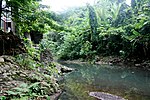International Rice Research Institute

The International Rice Research Institute (IRRI) is an international agricultural research and training organization with its headquarters in Los Baños, Laguna, in the Philippines, and offices in seventeen countries. IRRI is known for its work in developing rice varieties that contributed to the Green Revolution in the 1960s which preempted the famine in Asia.The institute, established in 1960 aims to reduce poverty and hunger, improve the health of rice farmers and consumers, and ensure environmental sustainability of rice farming. It advances its mission through collaborative research, partnerships, and the strengthening of the national agricultural research and extension systems of the countries IRRI works in.IRRI is one of 15 agricultural research centers in the world that form the CGIAR Consortium of International Agricultural Research Centers, a global partnership of organizations engaged in research on food security. It is also the largest non-profit agricultural research center in Asia.
Excerpt from the Wikipedia article International Rice Research Institute (License: CC BY-SA 3.0, Authors, Images).International Rice Research Institute
Pili Drive,
Geographical coordinates (GPS) Address Nearby Places Show on map
Geographical coordinates (GPS)
| Latitude | Longitude |
|---|---|
| N 14.17 ° | E 121.257 ° |
Address
Pili Drive
Pili Drive
4033
Laguna, Philippines
Open on Google Maps

